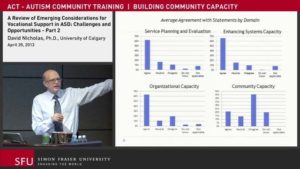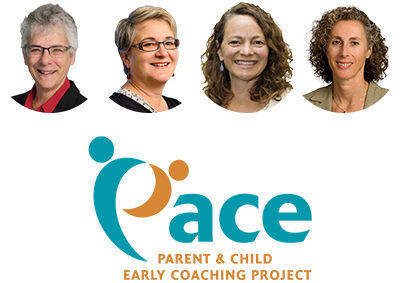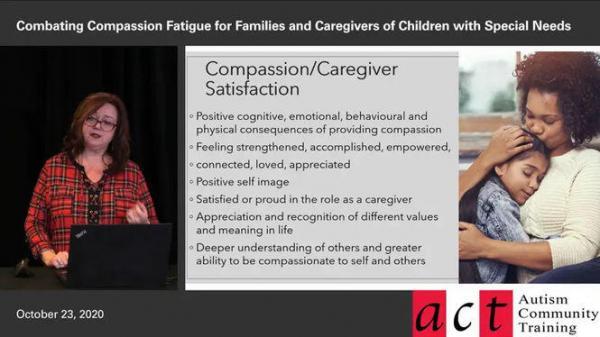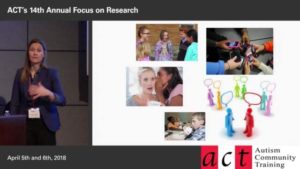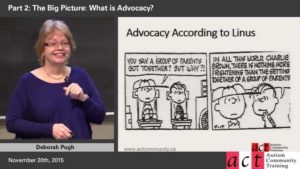Recordings from ACT’s Focus on Research Conference 2023
The goal of this video series is to improve understanding and support for autistic people who experience anxiety and sensory differences.
Captions and ASL interpretation are available for all videos.
Distinct expressions of anxiety in autistic individuals (and why they matter)
Connor Kerns, PhD
Presentation details
This talk describes challenges to the detection of anxiety problems in autistic individuals and provides a rationale for why overcoming these challenges – by recognizing and better understanding the distinct way autistic individuals may experience anxiety – is so important.
Dr. Connor Kerns has conducted and published studies on a broad array of topics including the role of paternal age in ASD risk, the co-occurrence of childhood psychopathologies, and differential predictors of Cognitive Behavioural Therapy’s (CBT) efficacy for child anxiety. Her present research focuses on the overlap, assessment and treatment of anxiety and autism spectrum disorders (ASD). Her ongoing projects aim to explore the varied presentation and phenomenology of anxiety in ASD and the implications of this variation for effective anxiety measurement and treatment. Dr. Kerns is also preparing to extend this work to the understudied area of traumatic events and their sequelae in youth with ASD. Another area of interest is the use of technology to facilitate the dissemination of empirically based treatments. Dr. Kerns is currently working to develop cost-effective, computer-assisted CBTs for youth with ASD and anxiety, interactive social stories to improve skill generalization in ASD, and video-enhanced ASD screening and educational tools. Her long terms goals include developing a parsimonious model of psychiatric co-occurrence to inform the design and dissemination of cross-diagnostic assessments and treatments that improve child wellbeing and development.
Presentation handouts:
Panel: Experiences with Anxiety
Presentation details
Moderated by Grace Iarocci, PhD
Grace Iarocci, PhD is a Professor of Psychology at Simon Fraser University, and the Director of the Autism and Developmental Disorders Lab. A registered psychologist, Dr. Iarocci works closely with government and community agencies in BC to disseminate research information on ASD and influence policy on ASD and other developmental disabilities. Grace has a particular interest in researching quality of life issues among families living with ASD.
Kenzie Curby
A 20-year-old, late diagnosed, autistic self-advocate with a strong voice, hoping to aid in the inclusion of the autistic community. Kenzie is passionate about voicing the importance of understanding demand avoidant profiles and co-occurring mental health disorders in autistic individuals. With over seven years supporting autistic youth both in the home and school settings, Kenzie’s goals are to bring acceptance and understanding for autistic individuals.
Coralee Curby
Coralee is a mother of two amazing neurodivergent kids, an educator and lover of learning new things. She has worked as a School Psychologist over the past 23 years with a combined background in education, counselling psychology, school psychology and specialized learning interventions. Coralee is most passionate about learning alongside her own children, working within schools to discover the unique gifts and strengths of each student, supporting strong and collaborative communities of care. Coralee is forever changed by the gift of mothering.
Kelsey Richards
Kelsey Richards, BSc. Kin., MOT is an Occupational Therapist at the Centre for Child Development in Surrey, BC. Kelsey conducts sensory assessments for children/youth referred by the Child and Youth Mental Health Team and Ministry of Children and Family Development Social Workers. The purpose of the sensory assessment is to help the child/youth and their caregivers gain awareness of unique sensory needs, explore and identify strategies to meet sensory needs, help reframe behaviour from a sensory lens, and finally support families to advocate for accommodations to enable participation in meaningful daily activities.
Narinder Bains
Narinder Bains is a registered nurse working in the Intensive Care Unit at Surrey Memorial Hospital. Outside the hospital, Narinder is an advocate for her 20-year-old nephew who has been diagnosed with autism since the age of three years old. For the past 17 years, his mother was the expert on how to advocate for her son and my role was to support her. After Narinder’s family suffered from her sisters loss last year, Narinder has been learning how to take on a role as advocate to ensure her nephew has his voice being heard in this space.
Hardeep Orimaco
Hardeep Orimaco has been working in the field of caring for others since she was 17 years of age. Hardeep first completed her community support worker diploma and worked in residential homes supporting young adults with mental health challenges and special needs. Hardeep went back to school and completed her practical nursing in 2003. This led Hardeep to work in long-term care and palliative care. In 2007 Hardeep started to foster children and youth with special needs in her own home. She is passionate about stabilizing and making a difference in the lives of the children and youth. Hardeep received her Bachelor of nursing in 2008. Since 2010 Hardeep has been a program manager overseeing operations of residential staffed homes for children and youth with special needs. Hardeep is a huge advocate for the children and youth in her care. She has two of her own biological children, a 9-year-old daughter and 4-year-old son. Hardeep believes in life-long learning and enjoys reading and nature walks.
Exploring Sensory Processing Subtypes in Autism
Nichole Scheerer, PhD
Presentation details
Autistic individuals often show different reactions to sensory information (e.g., sounds, sights, smells, etc.) in their environment. These reactions vary across autistic individuals and across sensory modalities. These sensory differences have been shown to promote behaviours that challenge and cause distress in autistic individuals. Sensory behaviours are predictive of other functions including motor, social, and cognitive abilities. Preliminary research suggests that specific sensory differences may cluster together within individuals creating discrete sensory processing subtypes. This talk focuses on research examining the existence of, and predictive power of sensory processing subtypes. Further, the relationship between sensory differences and anxiety are discussed.
Nichole Scheerer is an assistant professor in the Psychology Department at Wilfrid Laurier University in Waterloo, Ontario. Nichole received her PhD in Cognitive Neuroscience from Laurier in 2015. Nichole then completed postdoctoral training in the Autism and Developmental Disabilities Lab at Simon Fraser University, as well as the Brain and Mind Institute at Western University. Nichole’s research combines behavioural and electrophysiological techniques to investigate sensory processing in both typically and atypically developing people.
Presentation handouts:
Attention and Neurodivergent Sensory Experiences
Patrick Dwyer, PhD (c)
Presentation details
This presentation explores sensory processing and attention for neurodivergent people. Specifically, data and practical suggestions are presented on the relationship between hyper-reactivity and hypo-reactivity, and how anxiety and attentional hyper-vigilance are closely intertwined.
Patrick is an autistic PhD candidate in developmental psychology in the Neurocognitive Development Lab at the University of California, Davis. His main research interest is using various research methods, such as questionnaires, electrophysiology, eye-tracking, and cognitive tasks, to explore and understand sensory processing and attention in autism. More broadly, Patrick is interested in anything relevant to the well-being of autistic and neurodivergent people, and he has studied community perspectives regarding intervention and neurodiversity controversies. Patrick is a co-founder of the Autistic Researchers Committee at the International Society for Autism Research (INSAR) and helped to found a neurodivergent peer-support and advocacy community at UC Davis. He maintains a blog, autisticscholar.com. On a local note, Patrick grew up in B.C. and completed his undergraduate studies at the University of Victoria.
Presentation handouts:
Using artificial intelligence to improve quality of life of autistic children with decreased sound tolerance
Elina Birmingham, PhD & Siamak Arzanpour, PhD
Presentation details
Many children on the autism spectrum suffer from decreased sound tolerance (DST). When exposed to these sounds, children feel very distressed, which can cause them to react with behaviours such as covering their ears, yelling, or attempting to escape. Accommodations for DST, including earplugs or earmuffs, noise canceling headphones, or allowing them to take breaks in a quiet area may interfere with the child’s full participation in educational, community and family activities. To address this gap, we have developed a listening device that both detects and filters out specific sounds, delivering a “clean” signal to the user’s ears. We are currently testing the performance of the system in a VR environment.
Elina Birmingham, PhD, is an Associate Professor in the Educational Psychology area of the Faculty of Education at Simon Fraser University (SFU). She completed her PhD in Cognitive Psychology at the University of British Columbia in 2008, followed by postdoctoral fellowships at the California Institute of Technology, and Simon Fraser University. The overarching goal of her research is to better understand and support children, youth and adults on the Autism Spectrum. Her recent research spans the disciplines of psychology, education, and engineering. For example, in an interdisciplinary collaboration with SFU Mechatronic Systems Engineering (Siamak Arzanpour), she is working on creating smart technology using artificial intelligence to support autistic children, youth and adults who experience decreased sound tolerance. This work is funded by the Kids Brain Health Network (KBHN), a Network of Centres of Excellence.
Dr. Siamak Arzanpour received his PhD. in Mechanical and Mechatronics Engineering at the University of Waterloo in 2006. After two years of research as a Postdoctoral Fellow, he joined the School of Mechatronic Systems Engineering at Simon Fraser University in 2008.
Presentation handouts:
Panel: Early Development & Sensory
Presentation details
Moderated by Dr. Grace Iarocci
Grace Iarocci, PhD is a Professor of Psychology at Simon Fraser University, and the Director of the Autism and Developmental Disorders Lab. A registered psychologist, Dr. Iarocci works closely with government and community agencies in BC to disseminate research information on ASD and influence policy on ASD and other developmental disabilities. Grace has a particular interest in researching quality of life issues among families living with ASD.
Keith Landherr, MA, OT
Keith is the Director and founder of Little Buddies Pediatric Therapy Incorporated, where he strives to provide family-centred treatment to children and families. For over 30 years, Keith has been identifying and treating sensory processing differences in individuals from birth through adulthood. By honouring their unique histories and individual differences, he is able to create effective client centered practices. His work includes intensive early intervention programs, school-based services and private Occupational Therapy clinics in the lower mainland and New York City.
Keith has presented to child development centres in British Columbia and New York City, and has provided lectures for ICDL’s DIRFloortime® Training Program, New York City Department of Education, Babies and Children’s Hospital of New York, and as an adjunct professor of Occupational Therapy at NYU. Keith is a graduate of New York University’s (NYU) Occupational Therapy Program and has advanced training in Sensory Integration, Multiple Therapeutic Learning Systems, Neuro-Development Treatment, and is a certified DIRFloortime ®Trainer.
Anamaria Richardson
Anamaria Richardson is a (community based) pediatrician that works in Vancouver – prior to pediatrics she was a highschool teacher. Currently, she works with many Spanish speaking patients given her Latina heritage, with children who have severe behavioural complexity, and with Indigenous communities both local and remote. Her interest in health equity have resulted in a research program that aims to better understand the needs of specific patient populations as well as identifying leverage points for systems change – she believes we can always do things better.
Camila Ranasinghe
Chamila Ranasinghe is the mother of a 15-year-old son with autism spectrum disorder. She has been running an Applied Behaviour Analysis home program for her son for 13 years, with involvement of Behaviour Consultants, Behaviour Interventionists, Speech-Language Pathologists, Occupational Therapists and Physiotherapists. Chamila has more than 20-years experience working with children, as a teacher (English Language Learners) and an Early Childhood Educator.
Leaf Ludwig
Leaf is an autistic advocate who loves long naps with dogs, aquafit, and spending time in the forest. After obtaining a degree in biology from the University of British Columbia, Leaf has spent the past three years furthering their education and training. Currently, they are studying to work with people with sensory and communication disabilities. As a multiply disabled student, Leaf hopes to support their community by improving disabled students’ access to STEM education in particular. Leaf is committed to sharing their knowledge and experiences through consulting on autism focused research, and has been involved in various studies over the past few years.
Panel: Future in Research
Presentation details
Moderated by Michelle Schmidt, PhD
Michelle Schmidt, PhD is the Executive Director of ACT – Autism Community Training. Prior to joining ACT in 2022, Michelle Schmidt was involved in public education in British Columbia, as an educator, school psychologist, and administrator. Most recently, Michelle served as Director of Instruction in the Surrey School District, where she was responsible for inclusive education and supports for students with diverse abilities.
Connor Kerns
Dr. Connor Kerns has conducted and published studies on a broad array of topics including the role of paternal age in ASD risk, the co-occurrence of childhood psychopathologies, and differential predictors of Cognitive Behavioural Therapy’s (CBT) efficacy for child anxiety. Her present research focuses on the overlap, assessment and treatment of anxiety and autism spectrum disorders (ASD). Her ongoing projects aim to explore the varied presentation and phenomenology of anxiety in ASD and the implications of this variation for effective anxiety measurement and treatment. Dr. Kerns is also preparing to extend this work to the understudied area of traumatic events and their sequelae in youth with ASD. Another area of interest is the use of technology to facilitate the dissemination of empirically based treatments. Dr. Kerns is currently working to develop cost-effective, computer-assisted CBTs for youth with ASD and anxiety, interactive social stories to improve skill generalization in ASD, and video-enhanced ASD screening and educational tools. Her long terms goals include developing a parsimonious model of psychiatric co-occurrence to inform the design and dissemination of cross-diagnostic assessments and treatments that improve child wellbeing and development.
Patrick Dwyer
Patrick is an autistic PhD candidate in developmental psychology in the Neurocognitive Development Lab at the University of California, Davis. His main research interest is using various research methods, such as questionnaires, electrophysiology, eye-tracking, and cognitive tasks, to explore and understand sensory processing and attention in autism. More broadly, Patrick is interested in anything relevant to the well-being of autistic and neurodivergent people, and he has studied community perspectives regarding intervention and neurodiversity controversies. Patrick is a co-founder of the Autistic Researchers Committee at the International Society for Autism Research (INSAR) and helped to found a neurodivergent peer-support and advocacy community at UC Davis. He maintains a blog, autisticscholar.com. On a local note, Patrick grew up in B.C. and completed his undergraduate studies at the University of Victoria.
Nichole Scheerer
Nichole Scheerer is an assistant professor in the Psychology Department at Wilfrid Laurier University in Waterloo, Ontario. Nichole received her PhD in Cognitive Neuroscience from Laurier in 2015. Nichole then completed postdoctoral training in the Autism and Developmental Disabilities Lab at Simon Fraser University, as well as the Brain and Mind Institute at Western University. Nichole’s research combines behavioural and electrophysiological techniques to investigate sensory processing in both typically and atypically developing people.
Anamaria Richardson
Anamaria Richardson is a (community based) pediatrician working in Vancouver. Prior to pediatrics she was a high school teacher. Currently, she works with many Spanish speaking patients given her Latina heritage, with children who have severe behavioural complexity, and with Indigenous communities both local and remote. Her interest in health equity has resulted in a research program that aims to better understand the needs of specific patient populations as well as identifying leverage points for systems change – she believes we can always do things better.
Camila Ranasinghe
Chamila Ranasinghe is the mother of a 15-year-old son with autism spectrum disorder. She has been running an Applied Behaviour Analysis home program for her son for 13 years, with involvement of Behaviour Consultants, Behaviour Interventionists, Speech-Language Pathologists, Occupational Therapists and Physiotherapists. Chamila has more than 20-years experience working with children, as a teacher (English Language Learners) and an Early Childhood Educator.

